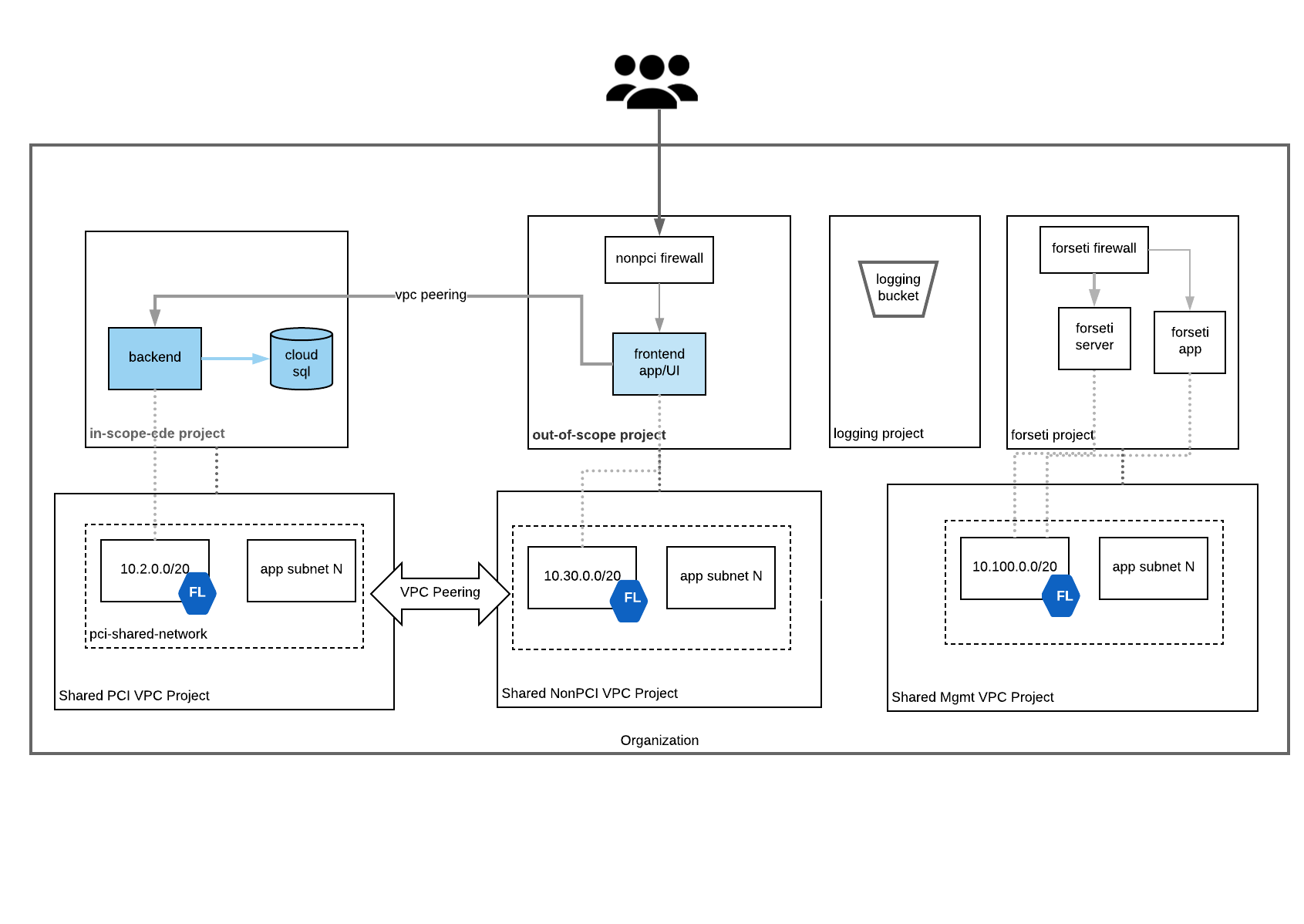PCI deployable architecture on GCP with Terraform
These terraform files build out an example PCI architecture in GCP. These have not been certified by a PCI DSS auditor.
Usage
set up TF environment
Set-up borrowed from please read this for a detailed description of what is going on.
gcloud organizations list
gcloud beta billing accounts list
export TF_VAR_org_id=YOUR_ORG_ID
export TF_VAR_billing_account=YOUR_BILLING_ACCOUNT_ID
export TF_ADMIN=${USER}-terraform-admin
export TF_CREDS=~/.config/gcloud/${USER}-terraform-admin.json
Create the Terraform Admin Project
gcloud projects create ${TF_ADMIN} \
--organization ${TF_VAR_org_id} \
--set-as-default
gcloud beta billing projects link ${TF_ADMIN} \
--billing-account ${TF_VAR_billing_account}
Create the Terraform service account and grant permissions
gcloud iam service-accounts create terraform \
--display-name "Terraform admin account"
gcloud iam service-accounts keys create ${TF_CREDS} \
--iam-account terraform@${TF_ADMIN}.iam.gserviceaccount.com
gcloud projects add-iam-policy-binding ${TF_ADMIN} \
--member serviceAccount:terraform@${TF_ADMIN}.iam.gserviceaccount.com \
--role roles/viewer
gcloud projects add-iam-policy-binding ${TF_ADMIN} \
--member serviceAccount:terraform@${TF_ADMIN}.iam.gserviceaccount.com \
--role roles/storage.admin
gcloud organizations add-iam-policy-binding ${TF_VAR_org_id} \
--member serviceAccount:terraform@${TF_ADMIN}.iam.gserviceaccount.com \
--role roles/resourcemanager.projectCreator
gcloud organizations add-iam-policy-binding ${TF_VAR_org_id} \
--member serviceAccount:terraform@${TF_ADMIN}.iam.gserviceaccount.com \
--role roles/billing.admin
gcloud organizations add-iam-policy-binding ${TF_VAR_org_id} \
--member serviceAccount:terraform@${TF_ADMIN}.iam.gserviceaccount.com \
--role roles/compute.admin
#sharedVPC
gcloud organizations add-iam-policy-binding ${TF_VAR_org_id} \
--member serviceAccount:terraform@${TF_ADMIN}.iam.gserviceaccount.com \
--role roles/compute.xpnAdmin
#cloudSQL
gcloud organizations add-iam-policy-binding ${TF_VAR_org_id} \
--member serviceAccount:terraform@${TF_ADMIN}.iam.gserviceaccount.com \
--role roles/cloudsql.admin
#orgadmin for foreseti IAM
gcloud organizations add-iam-policy-binding ${TF_VAR_org_id} \
--member serviceAccount:terraform@${TF_ADMIN}.iam.gserviceaccount.com \
--role roles/resourcemanager.organizationAdmin
#IAM for stackdriver
gcloud organizations add-iam-policy-binding ${TF_VAR_org_id} \
--member serviceAccount:terraform@${TF_ADMIN}.iam.gserviceaccount.com \
--role roles/logging.configWriter
# cloud armor
gcloud organizations add-iam-policy-binding ${TF_VAR_org_id} \
--member serviceAccount:terraform@${TF_ADMIN}.iam.gserviceaccount.com \
--role roles/compute.securityAdmin
Enable the following APIs
gcloud services enable cloudresourcemanager.googleapis.com
gcloud services enable cloudbilling.googleapis.com
gcloud services enable iam.googleapis.com
gcloud services enable compute.googleapis.com
gcloud services enable sqladmin.googleapis.com
gcloud services enable pubsub.googleapis.com
Set up remote state in Cloud Storage
gsutil mb -p ${TF_ADMIN} gs://${TF_ADMIN}
cat > backend.tf <<EOF
terraform {
backend "gcs" {
bucket = "${TF_ADMIN}"
prefix = "terraform/state"
project = "${TF_ADMIN}"
}
}
EOF
gsutil versioning set on gs://${TF_ADMIN}
Configure your environment for the Google Cloud Terraform provider:
export GOOGLE_APPLICATION_CREDENTIALS=${TF_CREDS}
export GOOGLE_PROJECT=${TF_ADMIN}
Edit the vars.tf file and modify the default values to meet your environment.
do some terraform!
terraform initto get the pluginsterraform planto see the infrastructure planterraform applyto apply the infrastructure buildterraform destroyto destroy the built infrastructure
Install Forseti
The instructions can be found here
Requirements
Installation Dependencies
Architecture
- Org Level sink
- PCI Shared VPC
- VPC peering with Non-PCI Shared VPC
- PCI Firewall allows inbound ssh
- Cloud Armor
- security policy: only allow traffic from a range of ip addresses
- In Scope CDE Project
- 1 GCE instance is deployed which has access to Cloud SQL
- Attach Cloud Armor policy to GCE instance
- DLP API is enabled
- Cloud SQL (mysql)
- Project Level sink with a filter GCE
- Non-PCI Shared VPC
- VPC peering with PCI Shared VPC
- Non-PCI Firewall allows inbound ssh and http
- Out of Scope Project
- 1 GCE instance is deployed which has access to Cloud SQL in the Out of Scope Project
- Logging Project
- GCS bucket
- MGMT Shared VPC
- Forseti Project
- Creates Forseti service account and permissions
- Installs Forseti
- Forseti Project
TODO
- Add TF project & service account set-up to this doc
- Deploy a real application, not just GCE instances
- Define IAM users / groups / roles
- Need to tie everything together - alerts, monitoring, etc
- Verify logs are being written to the stackdriver bucket
- delete forseti service account once forseti has been set-up
- clean up IAM permissions for TF service account they are probably too permissive
- Configure Forseti
- Document Forseti install steps - Module GitHub
Development
Linting
The makefile in this project will lint or sometimes just format any shell, Python, golang, Terraform, or Dockerfiles. The linters will only be run if the makefile finds files with the appropriate file extension.
All of the linter checks are in the default make target, so you just have to run
make -s
The -s is for 'silent'. Successful output looks like this
Running shellcheck
Running flake8
Running gofmt
Running terraform validate
Running hadolint on Dockerfiles
Test passed - Verified all file Apache 2 headers
The linters are as follows:
- Shell - shellcheck. Can be found in homebrew
- Python - flake8. Can be installed with 'pip install flake8'
- Golang - gofmt. gofmt comes with the standard golang installation. golang is a compiled language so there is no standard linter.
- Terraform - terraform has a built-in linter in the 'terraform validate' command.
- Dockerfiles - hadolint. Can be found in homebrew
